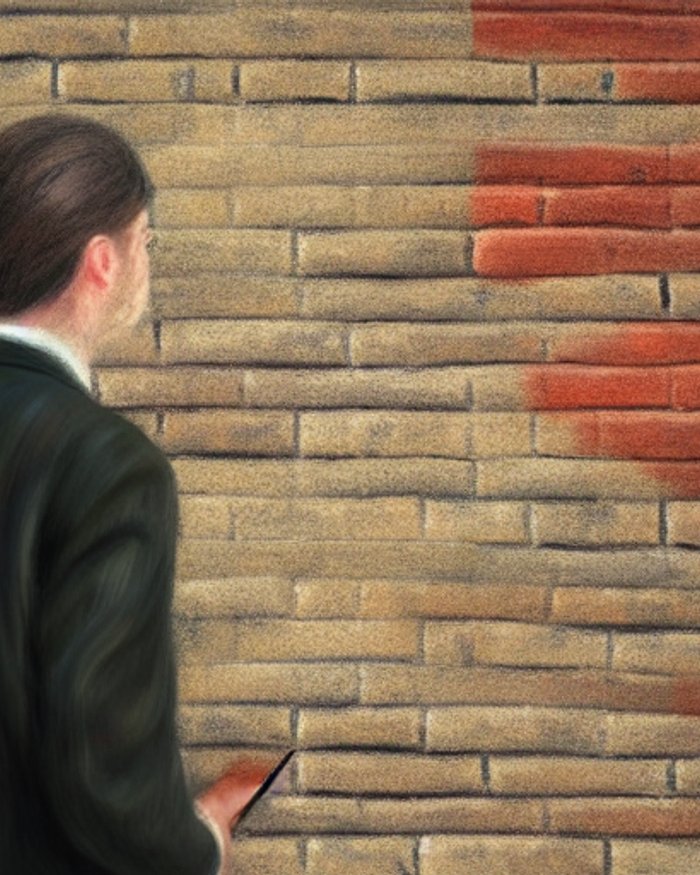Talk therapy exists for one fundamental reason. It works! The ways it works, however, are not always obvious or intuitive.
Oftentimes, the person we’re talking to helps us see things in a new light. They share a perspective that provides clarity—a flash of insight delivered at the perfect moment.
But even the most brilliant conversational partner can’t do all the heavy thinking for us. Some clarity emerges from work we do in our own heads. That’s why even talking to a brick wall can help you think more clearly, though to be clear there are better options.
Conversation gives us space to think clearly
Before someone can tell us what they think about a situation, we need to describe it to them. Ironically, this is often easier said than done.
We begin our story. We grapple with language and eventually, perhaps haltingly, attempt to describe what’s going on. When something we say doesn’t land right, we adjust our angle and try another approach. As we zig-zag our way towards shared understanding, three things may become apparent to us.
Conversation helps us loosen our grip
If you’ve ever struggled with a problem for a while, you might have felt like a scientist with a microscope. Zooming in on the most minute details, picking them apart atom by atom, searching for solutions within the problem itself.
Conversation forces us to lean back from the microscope. We have to zoom out to explain our problem to someone unfamiliar with the situation. We try a few different ways of describing it to see what clicks. Each time we try a different description, we may notice the problem changes subtly. The microscope has been replaced by a kaleidoscope. Every shift in perspective changes how the problem appears.
We get ourselves into all kinds of trouble when we become too attached to a single perspective. Conversation helps us loosen up and recognize that the way we interpret a situation has a huge effect on how we go about solving it.
When you loosen up, you open yourself up to the possibility that there might be a way of looking at things that makes your issue less of an issue.
Conversation separates us from our problems
When we’re stuck on a problem for a while, it can start to feel like it’s a part of us. It’s easy to see how this might happen. If we think about a problem all the time, it starts to feel like it’s always with us. We might start to believe that we are our problems. This is a dangerous mindset, because it means we’re no longer looking for solutions. We become so wrapped up in the problem itself that we can’t see a way out.
When we put our problems into words, we take them out of our heads and put them into the world. This gives us some distance; it helps us see our problems as something to deal with, not something that defines us.
With some space between us and our problems, it’s easier to start looking for ways to solve them.
Conversation makes gaps in our understanding more obvious
Sometimes, no matter how hard we try, we just can’t explain something. Perhaps we can’t find the words. Or the words we do find aren’t descriptive enough. Maybe they conflict with what we said before. Coming up short like this can be off-balancing. Just seconds before, you only had a problem. Now you have a problem and you’re not even sure what it is.
It’s a good thing to know where the limitations of your understanding lie. Mark Twain said it best, “It ain’t what you don’t know that gets you into trouble. It’s what you know for sure that just ain’t so.”
When you explain a problem from beginning to end, you step through its constituent parts logically. As you take each step, you have a chance to check it. Does this make sense? Does this assumption flow from what I said just a moment ago? Am I missing something in between?
Pinning down exactly what is and isn’t clear can be an extremely liberating experience. Maybe you couldn’t resolve the issue before because you couldn’t see one small part of it clearly enough. Now that you have a sense of what that is, you can try again.
Take advantage of your brain’s conversational prep work
There’s a lot of work your brain does in order to talk about your problems out loud. This work is often invisible to us, because we’re so used to thinking and talking at the same time.
But it’s important to remember that this work is happening, because it can help us solve our problems in ways we never would have thought of before. The next time you’re feeling stuck, try having a conversation with yourself. It just might help.
Back to the blog


